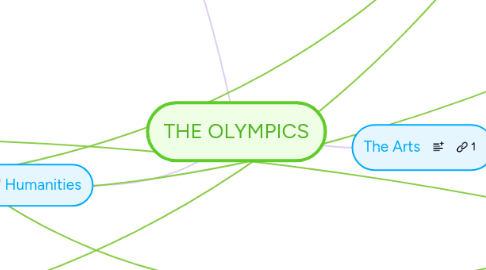
1. Humanities
1.1. Citizenship
1.1.1. Drug use
1.1.1.1. Activity: In pairs find an example of someone who has cheated in the olympics. Write a report on this person and then produce an anti cheating advertising campaign.
1.1.1.1.1. Assessment: Report and poster
1.1.2. Civic pride
1.1.2.1. Activity: Dress Aussie day. Why have you dressed this way? What does it mean to be Australian?
1.2. History
1.2.1. International Relations
1.2.1.1. Activity: The Olympics were held In Nazi Germany just before the Second World War. Have you ever done something because you were afraid of what would haven if you didn't? Reflect and share with the class.
1.2.1.2. Activity: The Olympics often stirs up big emotions between countries. Sometime this results in boycotts. Think of something that you or your family disagree with and have boycotted.
1.2.2. Greek Heritage
1.2.2.1. Activity: Greek Culture day. Music, Dancing, Food, Philosophy, Democracy, Gods.
1.2.3. Modern/Ancient
1.2.3.1. Activity: The class will split up into pairs. One of the pair will research the modern games and one will research the ancient games. They will then teach the other what they have learnt.
1.2.3.1.1. Assessment: Short video of an modern athlete competing against an ancient athlete.
1.3. Geography
1.3.1. Brazilian Culture
1.3.1.1. Activity: Basic Portuguese language skills. Learning phrases that could be useful if you were visiting Brazil. Practice with a partner.
1.3.1.2. Activity: Cook a Portuguese meal
1.3.2. Where in the world?
1.3.2.1. Activity: name countries who have had the Olympics. Where are they on the map? Colour these in. Do you notice any trends?
1.3.2.2. Activity: Colour in the flag of a competing country and write a simple report on their culture, socioeconomic status and success at the Olympics
1.3.2.2.1. Assessment: Presentation to the class on the chosen country.
2. The Arts
2.1. Music
2.1.1. World Music
2.1.1.1. Activity: What cultures can you see in the opening ceremonies? How are they represented? Which is the most prominent country? Why?
2.1.1.2. Activity: In small groups learn, practice and perform a Brazilian piece of music (National Anthem, Popular music etc.)
2.1.1.2.1. Assessment: Perform piece in a small class concert
2.1.2. Opening Ceremony
2.1.2.1. Activity: Watch previous opening ceremonies ie. notable performances
2.1.2.1.1. Activity: Create a poster that demonstrates what they notice from the opening ceremony (instruments, costumes, type of music, entertainment).
2.1.2.2. Activity: Students are to create their own national anthem. Choose a country, and write a list of the key features that identify with the country. Using these woulds, the students are to create a short melody that can be sung to signify that identifies with the country.
2.2. Dance
2.2.1. Movement in Sport
2.2.1.1. Activity: Students choose a sport, and replicate the movements they make to complete the sport (ie. rowing with arm movement). Using these movements, students come up with a short choreographed sequence to perform to the class (30 secs max)
2.2.2. Dance Around the World
2.2.2.1. Activity: Using footage from the a chosen opening ceremony, ascertain what movement is story-telling, representative or for creative effect etc.
2.3. Art
2.3.1. Historic Sport Figures
2.3.1.1. Activity: Students are to replicate a portrait of a notable sports figure using materials of their choice. The portrait must be A4 size
2.3.1.1.1. Assessment: Using Powerpoint, students are to create a short presentation that allows them to describe the artistic choices they made to create their artwork (conventions, techniques and materials). Students are to include pictures of the development of the piece and also the final product.
2.3.2. Olympic Rings
2.3.2.1. Activity: Research the significance of the Olympic Rings into an A4 poster
2.3.2.1.1. Activity: Using outdoor materials, students are to re-create the olympic rings. All materials must be natural (including the 'canvas' they do the task on)
2.4. Media Arts
2.4.1. Rio Olympic Media Coverage
2.4.1.1. Activity: Inquiry task where students are to research the media coverage leading up to the 2016 Olympics. Using media articles (magazine, television, newspaper, radio), students must create a magazine article talking about the viewpoints of the community, politics, characterisations and what is required for a country to host an the olympic games.
2.4.1.1.1. Assessment: Production of a Magazine article that draws on from information that is researched from the world wide media.
2.4.2. The First Olympic Games
2.4.2.1. Activity: Students are to use any form of technology to create an advertising campaign for the Olympic games in Olympia. The students need to include: title, when, where, graphics, and a slogan that entices people to compete. The campaign must include 1 poster, 1 video advertisement and a website
2.4.2.1.1. Assessment: The production of a full media kit (poster, video and website).
2.4.3. 2000 Sydney Olympics
2.4.3.1. Excursion: Sydney Olympic Park

